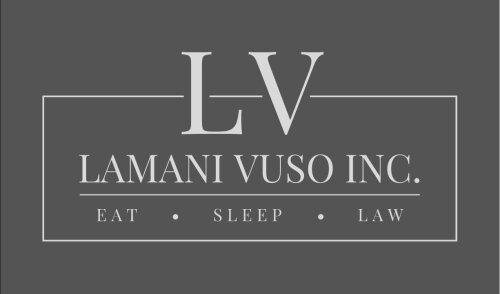Best Corporate & Commercial Lawyers in Cape Town
Share your needs with us, get contacted by law firms.
Free. Takes 2 min.
List of the best lawyers in Cape Town, South Africa
South Africa Corporate & Commercial Legal Questions answered by Lawyers
Browse our 1 legal question about Corporate & Commercial in South Africa and read the lawyer answers, or ask your own questions for free.
- Vehicle breakdown
- My vehicle broke down and I took it to a [company removed] dealership. The initial fault was an oil leak; after investigation they topped up the oil and started the vehicle. After a while they heard a knocking sound and some other noises, so they switched off the engine and... Read more →
-
Lawyer answer by mohammad mehdi ghanbari
Hello, Thank you for reaching out. I hope you are well. If the dealership caused additional damage to your vehicle, such as a connecting rod protrusion, due to negligence during repairs, they are generally legally responsible for fixing the new...
Read full answer
South Africa Corporate & Commercial Legal Articles
Browse our 1 legal article about Corporate & Commercial in South Africa written by expert lawyers.
- B-BBEE Compliance for International Firms in South Africa
- B-BBEE is a commercial imperative for international firms seeking to participate in the South African economy, particularly for government tenders and large-scale private supply chains. Multinationals can bypass the requirement to sell equity to local partners by utilizing Equity Equivalence Investment Programs (EEIP) approved by the government. Fronting, or misrepresenting... Read more →
About Corporate & Commercial Law in Cape Town, South Africa
Corporate and commercial law in Cape Town is a dynamic area of legal practice that governs the conduct, rights, and obligations of businesses, corporations, partnerships, and commercial transactions. With Cape Town being a major economic hub not only in the Western Cape but also in South Africa as a whole, the demand for corporate and commercial legal services is high. These laws impact how businesses are formed, operate, interact, merge, acquire, and ultimately cease operation. The sector includes areas such as company formations, mergers and acquisitions, contracts, compliance, intellectual property, employment issues, and dispute resolution.
Why You May Need a Lawyer
There are several scenarios where seeking legal counsel from a corporate and commercial lawyer in Cape Town is essential:
- Starting or registering a new business or company
- Drafting, reviewing, or negotiating business contracts and agreements
- Buying or selling a business or its assets
- Entering into joint ventures or partnerships
- Dealing with regulatory or compliance matters, such as Broad-Based Black Economic Empowerment (B-BBEE) requirements
- Protecting intellectual property such as trademarks and copyrights
- Navigating employment law relating to staff hiring or dismissals
- Resolving shareholder or director disputes
- Handling insolvency, liquidation, or restructuring
- Managing cross-border or international commercial transactions
Legal representation ensures that your business interests are protected, compliance requirements are met, and potential risks are minimised.
Local Laws Overview
Cape Town businesses operate under the overarching framework of South African law with some provincial and municipal regulations also applying. The main legal sources and statutes influencing corporate and commercial activity include:
- Companies Act No. 71 of 2008 - Governs the incorporation, operation, and dissolution of companies in South Africa.
- Close Corporations Act No. 69 of 1984 - Applicable to close corporations, though new registrations have ceased.
- Broad-Based Black Economic Empowerment (B-BBEE) Act - Encourages transformation and diversity in business ownership and management.
- Consumer Protection Act No. 68 of 2008 - Sets out the rights of consumers and obligations of businesses dealing with consumers.
- Competition Act No. 89 of 1998 - Regulates fair competition and merger control in the market.
- Labour Relations Act No. 66 of 1995 - Regulates employment and industrial relations within businesses.
- Cape Town-specific by-laws - Including zoning, signage, and health and safety regulations.
Compliance with these statutes, as well as tax obligations overseen by the South African Revenue Service (SARS), Reserve Bank regulations, and sector-specific licensing, is crucial for companies based in Cape Town.
Frequently Asked Questions
What is the difference between a company and a close corporation in South Africa?
A company is a separate legal entity formed under the Companies Act, usually chosen by larger businesses. A close corporation (CC) is a simpler, smaller entity that operated under the Close Corporations Act, but new CC registrations are no longer allowed since 2011. Existing CCs can continue, but new businesses must register as companies.
Do I need a lawyer to register a company in Cape Town?
While it is possible to register a company yourself through the Companies and Intellectual Property Commission (CIPC), consulting a lawyer ensures your memorandum of incorporation and other statutory documents are correctly prepared and compliant with the law.
What is B-BBEE, and how does it affect my business?
B-BBEE stands for Broad-Based Black Economic Empowerment. It is a government policy aimed at increasing participation and ownership by black individuals in the South African economy. Your business’s B-BBEE status can impact eligibility for government contracts and partnerships.
What are the tax obligations for companies in Cape Town?
All companies must register with SARS and comply with corporate tax, VAT, and other relevant tax requirements. Non-compliance can result in penalties and legal issues.
How do I protect my business’s intellectual property?
Protection is achieved by properly registering trademarks, copyrights, and patents with the relevant authorities. Legal advice ensures that your intellectual property is adequately safeguarded under South African law.
What should I do if I have a dispute with a business partner or shareholder?
Seek legal advice immediately. Many disputes can be resolved through negotiation or mediation if addressed early. If necessary, disputes may escalate to litigation or arbitration.
How do mergers and acquisitions work in South Africa?
Mergers and acquisitions involve complex legal and regulatory steps, including due diligence, negotiation of terms, and compliance with the Companies Act and Competition Commission approvals. It is recommended to have legal representation throughout the process.
Can foreign nationals start a business in Cape Town?
Yes, foreign nationals can start businesses in Cape Town but must comply with local laws, company registration requirements, and may need to adhere to special business visa provisions.
What are my legal obligations as an employer in Cape Town?
Employers must comply with laws like the Labour Relations Act, Basic Conditions of Employment Act, and uphold fair labour practices, provide employment contracts, and meet statutory benefit obligations such as UIF and skills levies.
How can I ensure my contracts are legally enforceable?
Contracts should be clear, unambiguous, and comply with South African contract law. Having a lawyer draft or review all contracts provides assurance that your interests are protected and the contract is legally binding.
Additional Resources
Here are some helpful local resources and agencies for further assistance:
- Companies and Intellectual Property Commission (CIPC)
- South African Revenue Service (SARS)
- Department of Trade, Industry and Competition
- Competition Commission of South Africa
- Western Cape Government: Economic Development and Tourism
- Cape Chamber of Commerce and Industry
- South African Institute of Chartered Accountants (for accounting compliance)
- City of Cape Town: Business Services
- Law Society of South Africa (for finding a qualified attorney)
Next Steps
If you require legal assistance in the field of corporate and commercial law in Cape Town, start by clearly defining your legal needs or business goals. Collect all relevant documents and information pertaining to your matter. Reach out to a qualified attorney or law firm that specialises in corporate and commercial law. Many firms offer an initial consultation to assess your needs and outline possible solutions. Consider legal costs and ensure you understand the fee structure up front. Remember, getting professional guidance early can prevent costly mistakes and position your business for long-term success.
If you are unsure where to begin, contact local bodies such as the Law Society of South Africa or the Cape Chamber of Commerce for recommendations, or consult the Companies and Intellectual Property Commission for guidance on business formation and compliance matters.
Lawzana helps you find the best lawyers and law firms in Cape Town through a curated and pre-screened list of qualified legal professionals. Our platform offers rankings and detailed profiles of attorneys and law firms, allowing you to compare based on practice areas, including Corporate & Commercial, experience, and client feedback.
Each profile includes a description of the firm's areas of practice, client reviews, team members and partners, year of establishment, spoken languages, office locations, contact information, social media presence, and any published articles or resources. Most firms on our platform speak English and are experienced in both local and international legal matters.
Get a quote from top-rated law firms in Cape Town, South Africa — quickly, securely, and without unnecessary hassle.
Disclaimer:
The information provided on this page is for general informational purposes only and does not constitute legal advice. While we strive to ensure the accuracy and relevance of the content, legal information may change over time, and interpretations of the law can vary. You should always consult with a qualified legal professional for advice specific to your situation.
We disclaim all liability for actions taken or not taken based on the content of this page. If you believe any information is incorrect or outdated, please contact us, and we will review and update it where appropriate.
Browse corporate & commercial law firms by service in Cape Town, South Africa
Cape Town, South Africa Attorneys in related practice areas.

















